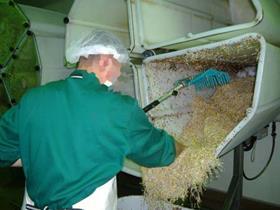
Photo Gallery: Gärtnerhof Bienenbüttel
The results of tests carried out on the first 23 of 40 beansprout samples taken from Gärtnerhof Bienenbüttel, the north German farm suspected of being involved in the recent EHEC E.coli outbreak, came back negative late Monday, 6 June, according to officials from Lower Saxony's regional agriculture ministry.
With further tests set to be conducted on beansprouts from the farm, and with other investigations ongoing elsewhere, the search for definitive proof as to where the original contamination might have occurred appeared set to continue into Tuesday, 7 June.
Professor Lüppo Ellerbroek, head of food hygiene and safety at Germany's Federal Institute for Risk Assessment, told NDR: 'We did not expect to find EHEC pathogens in the latest samples taken from the suspected facility.
'Nevertheless,' he added, 'this is no reason for complacency. The food which potentially was contaminated with EHEC pathogens would have been shipped from the farm weeks ago.'
In the meantime, the German government is coming under increasing pressure to resolve the crisis and to determine the source of the E.coli bacteria, with the combined effect of consumer fears and Russia's ban on all vegetable exports from the EU leading to a huge downturn in demand and prices in the European vegetable market.
Germany's earlier announcement that Spanish cucumbers were to blame for bringing the E.coli bug into Germany has also left it open to claims for compensation and intense criticism from within the fresh produce trade over its food safety monitoring processes.
Renate Künast, chairwoman of the Alliance '90/The Greens Bundestag parliamentary group and herself a former minister of consumer protection, food and agriculture, summed up the increasing sense of exasperation felt with the national government's handling of the crisis.
'I wonder what the health minister and the minister of consumer affairs actually do,' she said in an interview with the Berliner Zeitung.



